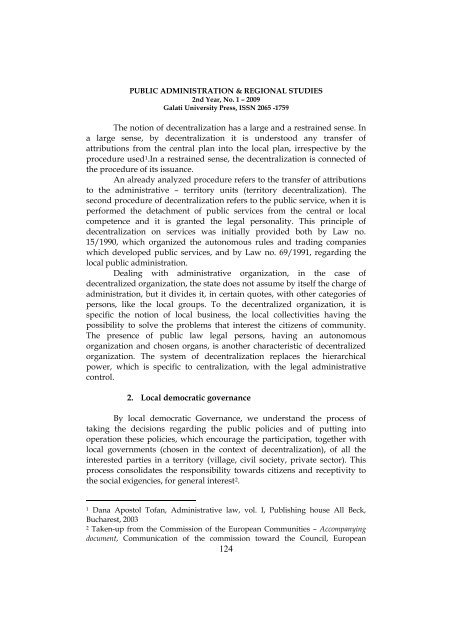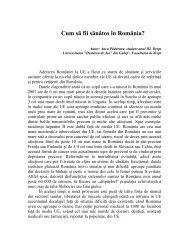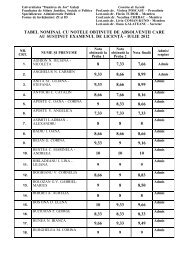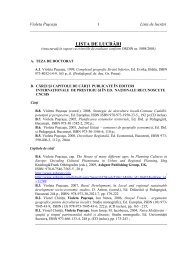regional studies public administration - Facultatea de Drept ...
regional studies public administration - Facultatea de Drept ...
regional studies public administration - Facultatea de Drept ...
You also want an ePaper? Increase the reach of your titles
YUMPU automatically turns print PDFs into web optimized ePapers that Google loves.
PUBLIC ADMINISTRATION & REGIONAL STUDIES<br />
2nd Year, No. 1 – 2009<br />
Galati University Press, ISSN 2065 -1759<br />
The notion of <strong>de</strong>centralization has a large and a restrained sense. In<br />
a large sense, by <strong>de</strong>centralization it is un<strong>de</strong>rstood any transfer of<br />
attributions from the central plan into the local plan, irrespective by the<br />
procedure used 1 .In a restrained sense, the <strong>de</strong>centralization is connected of<br />
the procedure of its issuance.<br />
An already analyzed procedure refers to the transfer of attributions<br />
to the administrative – territory units (territory <strong>de</strong>centralization). The<br />
second procedure of <strong>de</strong>centralization refers to the <strong>public</strong> service, when it is<br />
performed the <strong>de</strong>tachment of <strong>public</strong> services from the central or local<br />
competence and it is granted the legal personality. This principle of<br />
<strong>de</strong>centralization on services was initially provi<strong>de</strong>d both by Law no.<br />
15/1990, which organized the autonomous rules and trading companies<br />
which <strong>de</strong>veloped <strong>public</strong> services, and by Law no. 69/1991, regarding the<br />
local <strong>public</strong> <strong>administration</strong>.<br />
Dealing with administrative organization, in the case of<br />
<strong>de</strong>centralized organization, the state does not assume by itself the charge of<br />
<strong>administration</strong>, but it divi<strong>de</strong>s it, in certain quotes, with other categories of<br />
persons, like the local groups. To the <strong>de</strong>centralized organization, it is<br />
specific the notion of local business, the local collectivities having the<br />
possibility to solve the problems that interest the citizens of community.<br />
The presence of <strong>public</strong> law legal persons, having an autonomous<br />
organization and chosen organs, is another characteristic of <strong>de</strong>centralized<br />
organization. The system of <strong>de</strong>centralization replaces the hierarchical<br />
power, which is specific to centralization, with the legal administrative<br />
control.<br />
2. Local <strong>de</strong>mocratic governance<br />
By local <strong>de</strong>mocratic Governance, we un<strong>de</strong>rstand the process of<br />
taking the <strong>de</strong>cisions regarding the <strong>public</strong> policies and of putting into<br />
operation these policies, which encourage the participation, together with<br />
local governments (chosen in the context of <strong>de</strong>centralization), of all the<br />
interested parties in a territory (village, civil society, private sector). This<br />
process consolidates the responsibility towards citizens and receptivity to<br />
the social exigencies, for general interest 2 .<br />
1 Dana Apostol Tofan, Administrative law, vol. I, Publishing house All Beck,<br />
Bucharest, 2003<br />
2 Taken-up from the Commission of the European Communities – Accompanying<br />
document, Communication of the commission toward the Council, European<br />
124

















